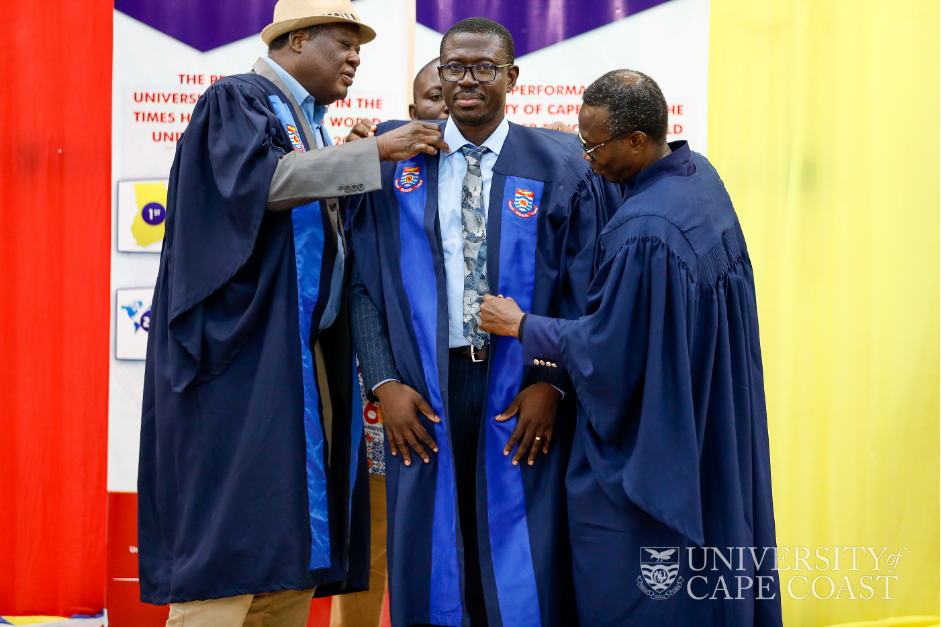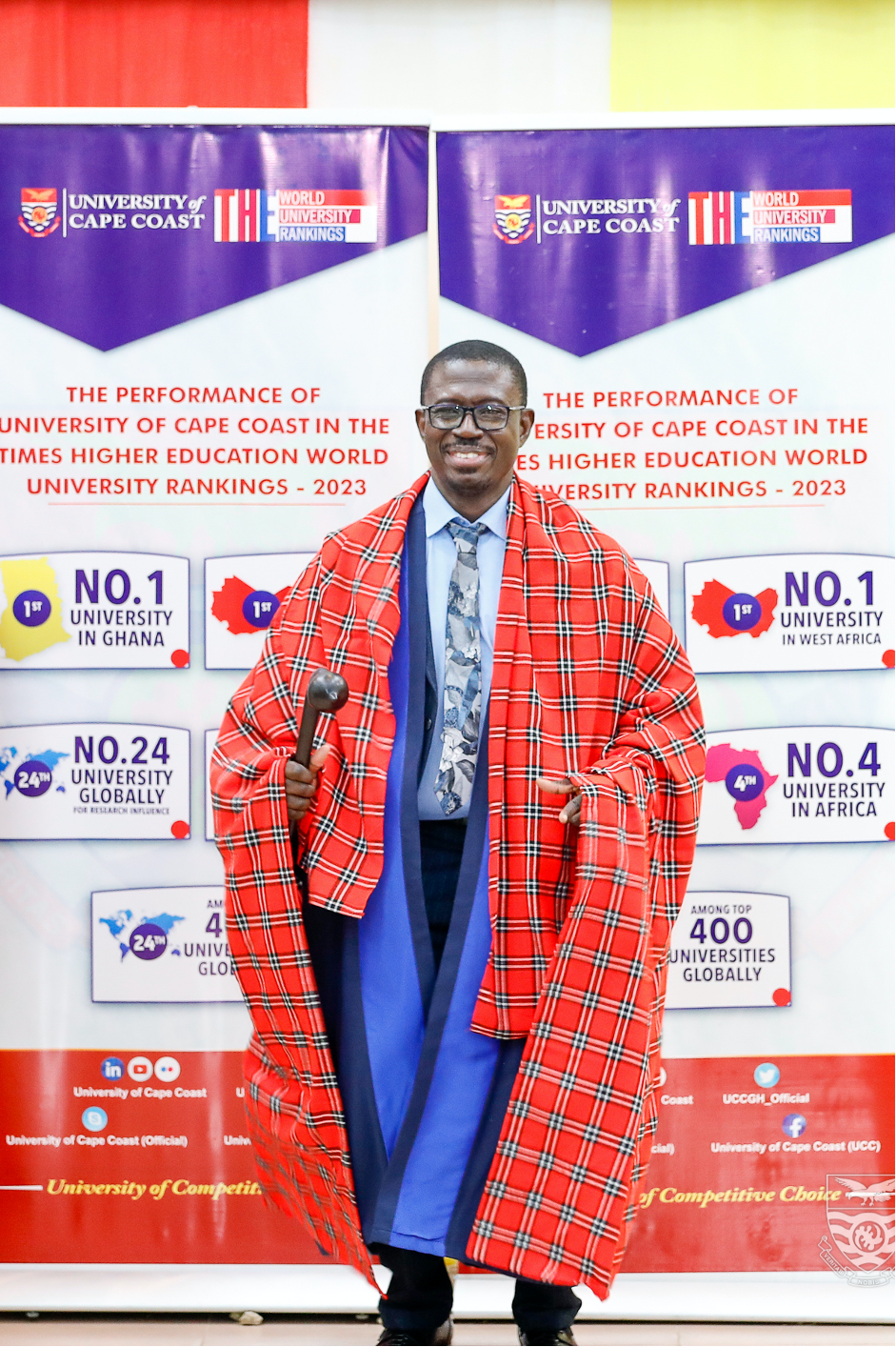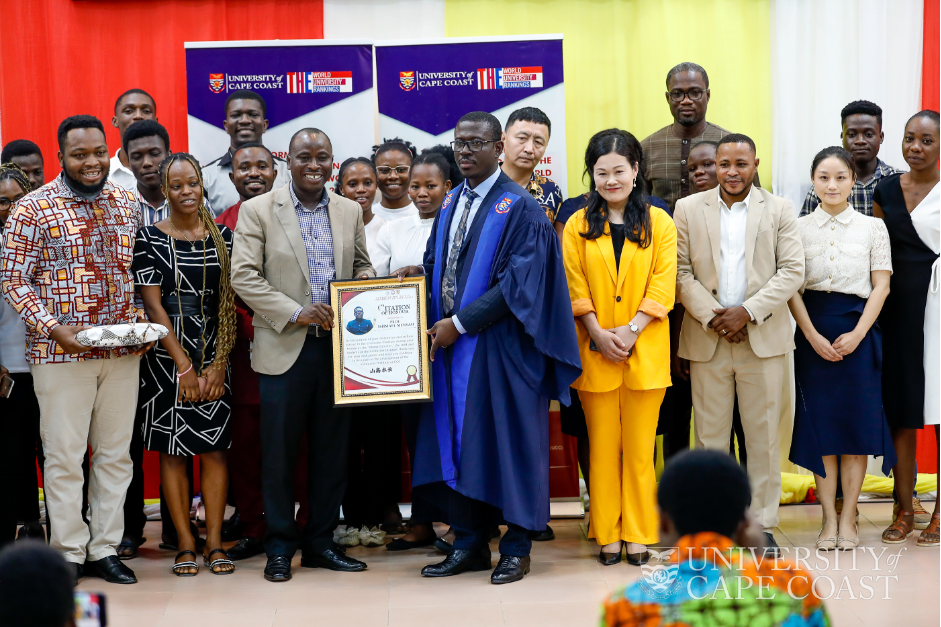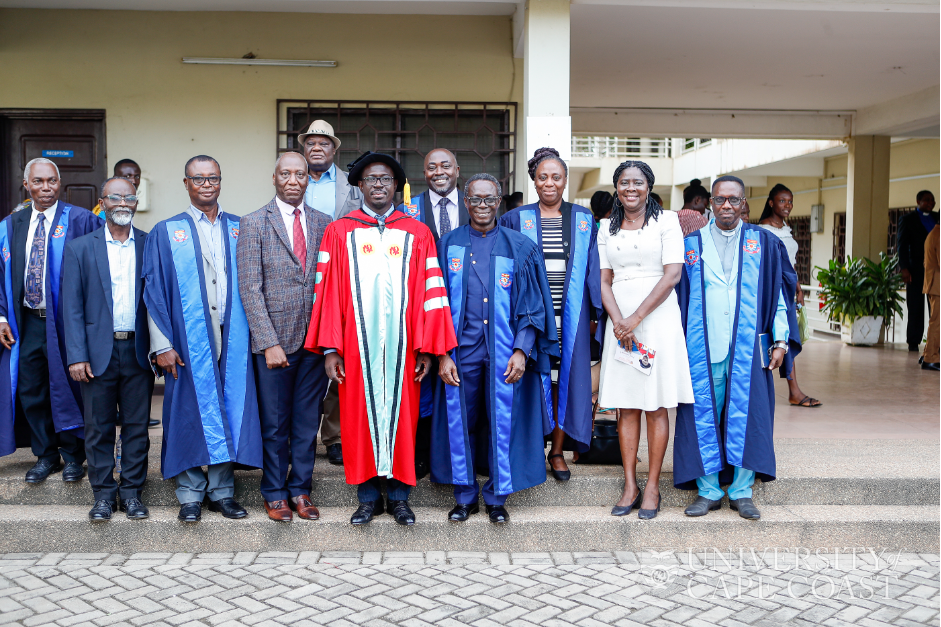A professor of Tourism and Hospitality Management, Prof. Ishmael Mensah, has appealed to stakeholders and operators in the tourism value chain to involve local communities in coastal tourism development.
He observed that local communities were the linchpin of the protection of coastal resources and sustainability of the tourism industry and, therefore, urged tourism practitioners to consider the aspirations of the locals at various stages of tourism development.
"If we involve them (local people in the communities), then they will have the sense of ownership and will want to help safeguard the beach" said Prof Mensah, who maintained that such a move would stamp out the destructive acts by locals along the coasts.

Prof. Ishmael Mensah being robed after his inaugural lecture by the VC-UCC, Prof Nyarko Boampong (right) and Prof. Machiste Abane (left),both members of the College of Professors-UCC
Prof. Mensah said this whilst delivering his inaugural lecture on the topic, "Evolution of Coastal Tourism in Ghana: Paradise Found, Paradise Lost, or Paradise Regained?"
The lecture was attended by members of academia, civil society orgainsations, students and other personalities.
Shedding light on his research about community participation, he maintained that local communities were always subjected to tokenism and that authorities in the tourism sector blatantly sidelined local communities from tourism development.
"Again as a researcher, I have done a lot of community participation in the communities around the Kakum National Park and also Bobiri Forest Reserve and it has always been clear that local communities are always subject to some tokenism that community participation often is just a facade. In reality, communities are not involved in tourism" Prof. Mensah said.

Prof Mensah decorated by a relation in the traditional clothes of the people of Masai in Kenya
He described as alarming the rate at which huge piles of plastic were washed into the sea and onto the beaches, forcing revelers to nickname some as 'borla beach', 'titanic beach' among others.
Prof. Mensah expressed grave concern about the disappearing wildlife, vegetation species, animals, monuments and sands at beaches as a result of the destructive activities of locals and coastal erosion, as well as climate change.
To make tourism attractive, he called for stiffer legislation to ward off miscreants in communities from destroying the coastal environment and asked for pragmatic measures to mitigate the negative impact of climate change on the tourism sector.
He admitted that legislation was not enough to ensure a clean beach and, therefore, recommeded the establishment of a coastal or beach authority to prevent illegal mining of sand, open defecation and the dumping of refuse at the beaches.

Prof. Mensah receiving a citation from the Ghana Director of the Confucius Institute-UCC (CIUCC) Prof. Emmanuel Amo Ofori with staff of the institute. Also on the stage is Prof. Ou Yamei, China Director of CIUCC (in yellow)
Whilst lauding successive governments for constructing sea defense walls along beaches to prevent erosion, Prof. Mensah questioned the rationale behind the construction of rocky sea defense walls along all the beaches in the country.
He, however, pointed out that "For certain aspect of the sea, we can import sand from other parts of the country to fill up and widen the areas that are used for recreational purposes."
Speaking further, Prof. Mensah implored all players in the tourism sector to prioritise customer service to attract more clients to their facilities.
"I believe that the quality of services at our resorts and our hotels along the beaches need to improve drastically," he observed. To that end, Prof. Mensah recommended the training of managers and staff who host visitors and guests at tourism facilities in the country on quality customer care service delivery.

Prof. Mensah in a group shot with the Vice-Chancellor, Prof. Johnson Nyarko Boampong (3rd from right-front row); Pro VC-UCC, Prof. Rosemond Boohene (2nd from right-front row), Registrar UCC, Mr. Jeff Teye Emmanuel Onyame (3rd from left) and members of the College of Professors.
The inaugural lecture was chaired by the Vice-Chancellor, Prof. Johnson Nyarko Boampong, who called on Ghanaians to think about the unborn generation and changed their attitude towards water bodies and forests in the country.
Facts about Prof. Ishmael Mensah:
Grew up in Shiabu in the Ablekuma West Municipality of the Greater Accra.
Started primary education at Datus Preparatory Primary School, Dansoman in 1980.
Proceeded to Business College (CIBUSCO) for his GCE Ordinary Level in 1991 and Ghana
Attended Ghana National College for his GCE Advanced Level in 1993
Obtained BSc. (Tourism), MPhil. (Tourism) and PhD (Tourism) degrees from University of Cape Coast
Received Postgraduate Certificates in Hospitality Administration as well as Event Planning & Tradeshow Management from Georgia State University where he was a Fellow under the Ghana Tourism Capacity Development Initiative.
Began his academic career in August 2004 as a Senior Research Assistant at the erstwhile Department of Geography and Tourism, UCC.
Rose through the ranks, to become a Lecturer in 2006; Senior Lecturer in 2010; Associate Professor in 2015
Supervised 10 PhDs and 15 MPhils and mentored several younger professionals as well as facilitated several training programmes.
External Examiner for a number of universities including Koforidua Technical University, Ho Technical University, University of Energy and Natural Resources, University of Kwazulu Natal, Durban Universityg of Technology, Universiti Teknologi MARA and Hunan City University.
Served as Ghana Director of the Confucius Institute at the University of Cape Coast from 2018-2023.
Served as a member, of the EuroCHRIE 2022 Board of Reviewers, Council on Hotel, Restaurant and Institutional Education (CHRIE)
Served as Hall Tutor at the Casely Hayford Hall
Member of the United Nations Group of Experts of the Regular Process for Global Reporting and Assessment of the State of the Marine Environment, including Socio-economic aspects
Member of Ghana Tertiary Education Council (GTEC) Accreditation Panel for Tourism and Hospitality programmes and Ex-officio Executive Member of the Central Region Chapter of the Ghana Tourism Federation (GHATOF).
Published widely in high-ranking academic journals in the areas of destination marketing, service quality, environmental management in hotels, special events management and community-based tourism development.
Has over 50 publications, including eight (8) books, 15 book chapters and 33 peer-reviewed articles.
Served on the editorial boards of renowned local and international journals co-edits the Proceedings of the China-Africa Urban Development Forum.
Founding Editor-In-Chief of the African Journal of Hospitality and Tourism Management.
Ranked among the top 10 scientists in the field of Tourism and Hospitality in Africa by AD Scientific Index 2023.
Consulted for a number of public and private organisations including Ghana Dock Labour Co. Ltd., Electricity Company of Ghana, Ghana Tourism Authority, Centre for National Culture and Ghana Museums and Monuments Board
Visiting Lecturer in the Masters in Tourism Programme at the University of Girona
Delivered keynote presentations, speeches, seminars, webinars and workshops at both academic and professional conferences in a number of institutions including University of Papua New Guinea, Amity University, Kolkata, Universiti Teknologi MARA, and University of Santo Tomas - Legazpi.
Married to Prof. Mrs. Rebecca Dei Mensah and blessed with three lovely children
A staunch member of the Church of Pentecost (PIWC, Cape Coast)
Promoted to full-fledged Professor of Tourism and Hospitality Management in 2020
Delivered inaugural lecture on Evolution of Coastal Tourism in Ghana:Paradise Found, Paradise Lost or Paradise Regained? on Wednesday, August 2, 2023.
Source: Documentation and Information Section - UCC

